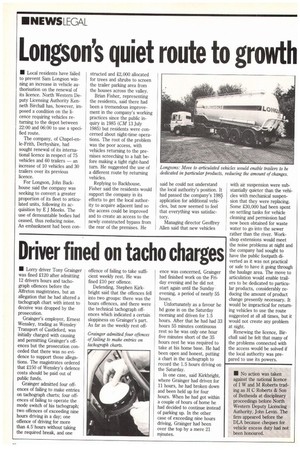Longson's quiet route to growth
Page 20

If you've noticed an error in this article please click here to report it so we can fix it.
• Local residents have failed to prevent Sam Longson winning an increase in vehicle authorisation on the renewal of its licence. North Western Deputy Licensing Authority Kenneth Birchall has, however, imposed a condition on the licence requiring vehicles returning to the depot between 22:00 and 06:00 to use a specified route.
The company, of Chapel-enle-Frith, Derbyshire, had sought renewal of its international licence in respect of 75 vehicles and 60 trailers — an increase of 10 vehicles and 30 trailers over its previous licence.
For Longson, John Backhouse said the company was seeking to convert a greater proportion of its fleet to articulated units, following its acquisition by E J Meeks. The use of demountable bodies had ceased, thus reducing noise. An embankment had been con structed and £2,000 allocated for trees and shrubs to screen the trailer parking area from the houses across the valley.
Brian Fisher, representing the residents, said there had been a tremendous improvement in the company's working practices since the public inquiry in 1985 (CM 13 July 1985) but residents were concerned about night-time operations. The root of the problem was the poor access, with vehicles returning to the premises screeching to a halt before making a tight right-hand turn. He suggested the use of a different route by returning vehicles.
Replying to Backhouse, Fisher said the residents would support the company in its efforts to get the local authority to acquire adjacent land so the access could be improved and to create an access to the newly constructed bypass from the rear of the premises. He said he could not understand the local authority's position. It had passed the company's 198 application for additional vehicles, but now seemed to feel that everything was satisfactory.
Managing director Geoffrey Allen said that new vehicles with air suspension were substantially quieter than the vehicles with mechanical suspension that they were replacing. Some £30,000 had been spent on settling tanks for vehicle cleaning and permission had now been obtained for waste water to go into the sewer rather than the river. Workshop extensions would meet the noise problems at night and the company had sought to have the public footpath diverted as it was not practical or safe to have it going through the haulage area. The move to articulation would enable trailers to be dedicated to particular products, considerably reducing the amount of product change presently necessary. It would be impractical for returning vehicles to use the route suggested at all all times, but it would not create any problem at night.
Renewing the licence, Birchall said he felt that many of the problems connected with the access would be solved if the local authority was prepared to use its powers.






















































































